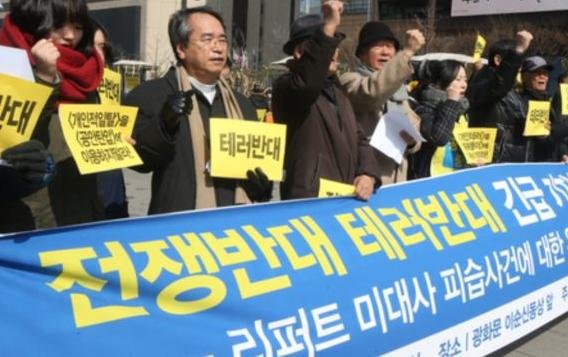A South Korean civic group staged a protest in response to the Thursday attack on top U.S. envoy Mark Lippert in Seoul. The banner reads, in translation, "Against war, against terrorism." The country is on high alert after the knife assault on the ambassador. Photo by Yonhap
SEOUL, March 5 (UPI) -- An early morning knife attack against Mark Lippert, the top U.S. envoy to South Korea, gripped the country and stunned ordinary South Koreans Thursday.
Lippert, 42, was preparing to deliver a guest lecture at the invitation of the Korean Council for Reconciliation and Cooperation in Seoul, when the alleged assailant, Kim Ki-jong, 55, came from behind and attacked a seated Lippert.
Yonhap reported the incident took place in just four minutes.
Closed circuit television monitors inside the building show Lippert entering at 7:33 a.m. The assailant arrives from a separate entryway at 7:36 a.m. Then, surveillance cameras in the hallway show a bleeding Lippert hurrying outside at 7:40 a.m.
Once outside, video footage showed Lippert, gripping his face, saying, "I need an ambulance fast. Get me to the hospital."
By late afternoon, Lippert, known for his friendly engagement with the South Korean public tweeted that he was "doing well" and "in great spirits". He said he was "deeply moved by the support" and "will be back to advance the U.S.-R.O.K. alliance."
He then wrote in Korean, "Let's move forward together!"
Yonhap reported many South Koreans denounced the attack.
A Seoul taxi driver with the surname Jeong said, "There is no justification for this kind of violence, no matter what your cause."
As police promptly arrested the suspected assailant, he had denounced the joint military exercises between the two countries.
Other South Koreans feared the incident would exacerbate tensions on the Korean peninsula.
"I'm worried that an attack on a South Korea-friendly U.S. ambassador could be used to make the situation worse," said Ku Yeong-mo, an office worker in Seoul.
South Korean President Park Geun-hye, on a trip to the Middle East, denounced the assault as an attack on the U.S.-South Korea alliance.
Kim, the suspect, has been described by acquaintances as an estranged political activist, Yonhap reported.
In 2010, Kim had received a prison sentence for hurling blocks of concrete at the Japanese ambassador to South Korea.
Seoul's unification ministry also confirmed Kim had visited North Korea seven to eight times from 2006 to 2007, to plant trees in the North Korean city of Kaesong.
North Korea's news agency said the attack on the U.S. ambassador was "righteous punishment for a warmongering United States."
The South Korean government said it will step up public security and the work of the U.S.-South Korea alliance will be conducted with increased confidentiality.















